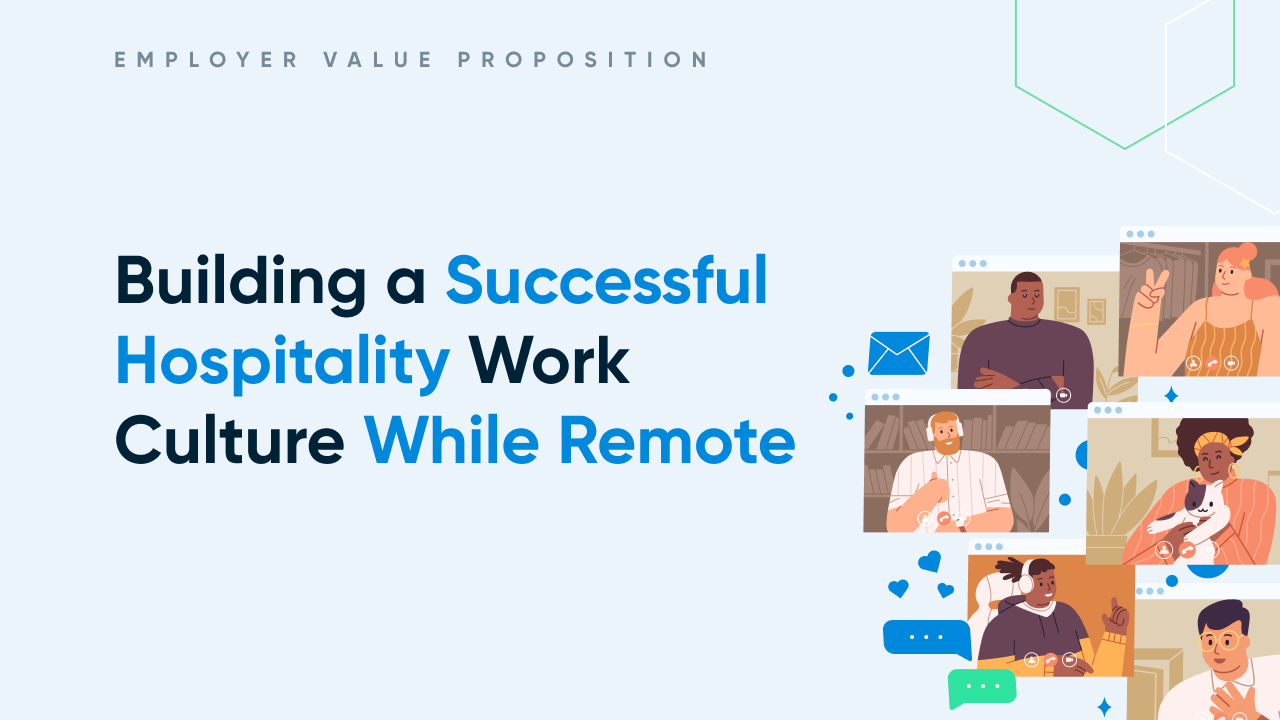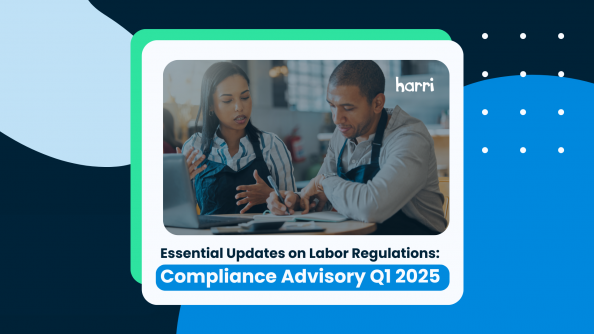Building a Successful Hospitality Work Culture While Remote

- By Harri Insider Team | September 28, 2021
Companies with strong company culture outperform those without by 202%*. And that’s all we’ll say on the “why”. Because it’s 2021 and we’ve spent the last few years competing for talent in hospitality, and let’s be honest, what have you been doing if you’ve not been focused on this?
When looking to build a strong remote culture, the focus is on how you foster a connection amongst a dispersed team – who, in some instances, may never actually meet in person. It takes intention, mindfulness and a complete rethinking of how employees work together to make remote work a success. Not to mention when your central team may be remote while your operational team are, well, operationally based… An added complexity but one you can make a success.
This is why we’ve collated these 10 tips on how to create a successful remote culture in hospitality.
1. Be explicit about your mission and goals.
The only way to build a high-performance remote culture is to ensure that your team understands the mission and goals. Ensure you’re communicating this. Often. It’s also key to continually remind each individual of the role they play in supporting this, ensuring the success of this vision, as well as your collective team.
With a hybrid staffing model where some team members are remote and some operational, it’s still essential that you bring the two together, to set this agenda, so your company understands and feels that you’re collectively working towards the same purpose, irrespective of location. An easy way to do this, of course, is to use Harri’s team communications tools. By creating group chats, or using one to one messaging, you can ensure that team members are engaged and can collaborate effectively – all from one single app.
2. Create trust and safety
How? Firstly, leaders must ensure that employees feel that they can confidently speak up and will be listened to without judgement. That it’s okay to make mistakes – and that being proactive and participating is key – not always getting it right the first time. This builds a culture of trust that is an essential component of remote work. Then, it’s key that beyond you as a leader, you teach your teams to give feedback that doesn’t blame. This will build engagement across the whole team.
3. Create boundaries for your team
It’s easy to respond to requests from the operation at any time when working remotely, as there is a fear that we should stay actively engaged and we want to show our non-9-5 colleagues that we’ve got their back. And, that is okay, we’d even encourage it as a means to drive collaboration.
However, it’s important to clear time for your team to work on meaningful work that requires uninterrupted attention. Block time out of their calendar, status settings on internal messaging systems – find something that works for your team.
4. Create rituals!
Recurring team meetings; shared project planning through online whiteboards; planning get-togethers on a Monday; monthly socials. They are all key! Not just between your central team, but with the operational teams. You don’t have to be on-site to connect with the team there, as long as you have rituals and put aside time to connect and collaborate.
5. Define how you work together
It’s a good idea to do exercises like taking the 16Personalities test and writing personal manifestos to help team members, as well as direct key stakeholders, understand each other. Also, provide a digital venue for watercooler conversation that allows team members to talk about non-work-related topics and get to know one another.
6. Ask for feedback. Often.
It’s important to keep a temperature check on employees, especially when working during difficult times such as COVID. While most of the industry has returned to some sort of normality, employees might still feel anxiety about working and shifts can be challenging for many reasons. Harri’s Time & Attendance feedback tools allow employees to give feedback when clocking out of a shift in order to give a snapshot of how their day was, and flag any issues straight away. Not only is this a chance for employees to give personal feedback, managers can also ask specific questions about menu items, specials and offers that have been put on that day.
Any feedback is important to be shared with onsite and remote teams so that everyone can act on suggestions and managers and operators can be constantly improving performance and ensuring that teams are feeling supported in the best way possible.
7. Focus on engagement
Host themed days. Exchange pet photos. Send shared mugs. It’s not rocket science, but it helps people feel connected.
8. The weekly 1:1 is essential
When not working with your team daily, it’s easy to get side-tracked with work that isn’t a priority or get stuck on projects that you feel helpless in moving forward. Check-in with each of your team, as well as your on-site teams, separately, once per week as a minimum. But keep the lines of communication open constantly. It’s super important for your team to feel that they have support whenever they need it.
9. Take more time with onboarding
This may be simple but so few get it right. Design a 2-week schedule of meetings and immersion with the team and all-important stakeholders. Harri’s onboarding tools give your employees an excellent starting point in the company and reduce the manual administrative side of bringing on new employees. With the entire process being digitised, it means that all information can be found in one place and both employees and employers have a seamless onboarding experience.
Once you have dotted all the i’s and crossed all the t’s, make sure you continue to support employees and hold hands for longer than you would usually, especially throughout those first projects.
10. Don’t stop the focus on development
Incorporate rituals that will help everyone grow individually as well as a group: discuss each person’s goal at a performance review and set a metric to measure progress, host a workshop on giving feedback, or set time weekly for regular lunch and learns. Whatever you do, just make it a priority.
One of the most important aspects of building trust and a sense of belonging in a remote team is helping everyone connect with their peers as well as the wider business: and these 10 tips will get you there!
If you want to find out more about how Harri can support your remote central teams, book a demo by clicking here.




















